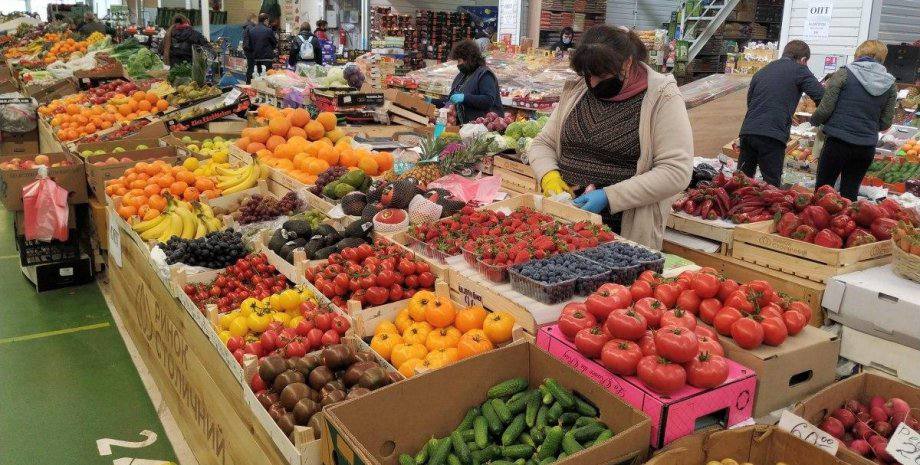
Prices in Ukraine are rising and will probably continue to do so.
What will happen to the price of products in the last month of summer and autumn - said the expert and the Ukrainian Agrarian Council Deputy Chairman Denys Marchuk.
The price position of any sold product is always affected by the increase in prices for fuel and lubricants. The equalization of the dollar exchange rate will also have an influence.
"First of all, we are talking about imported goods that we buy, that means, products that come across the border. The logistics of their delivery is much longer than for those goods that we manufacture domestically, plus customs clearance. Accordingly, these products can increase in price from 6 to 10%," the expert noted.
At the same time, the inflation factor affects the situation. Now it is about 21%, and by the end of the year it may reach 30%. Prices will rise accordingly.
The only segment where stabilization may be is seasonal product groups.
"Now, at the start of the vegetable season, the price, although is not too low, but not increasing either. Because, despite the occupation of the southern regions and the impossibility of delivering vegetables from Kherson and Mykolaiv regions, the market diversified risks in time - both the Center and the West of Ukraine sowed enough vegetables" explained Denys Marchuk.
So, nowadays products appear on the market, there is no shortage.
Contributes to the stability of prices for vegetables and fruits and the climate.
"Many regions that could not grow certain types of products nowadays are actively specializing in this. For example, in Vinnytsia and Cherkasy they grow watermelons. Farmers showed me five to ten hectares planted with watermelons. They didn't have that before. Likewise, with grapes. I have never seen large grape orchards in Vinnytsia. And nowadays the guys specialize in this. Grapes are grown in normal conditions, sold and have all the prospects," said Denys Marchuk.
The Deputy Chairman of the Ukrainian Agrarian Council reassures Ukrainians about prices for buckwheat. With the new harvest, the expert assures, they should fall.
"When we start the active buckwheat harvesting season, we will have quite good indicators," the specialist is convinced. During the past seasons, buckwheat was sown much less - about 70 thousand hectares (buckwheat yield - about 1 t per 1 ha, - Ed.), although consumption reaches about 150-160 thousand tons. Therefore, in fact, Ukraine did not fully provide itself with buckwheat.
"Nowadays, due to the war, the demand for such niche crops is quite high, so the area for them has been increased. There is a belief that after the buckwheat is harvested, the price will decrease," predicted Denys Marchuk.
Buckwheat prices may drop to UAH50-60, while they are UAH80-100 nowadays.
"Therefore, it is not necessary to create panic, excitement and buy bags of this product, so as not to provoke a speculative price," the expert urged.
Prices for "milk" are not expected to rise until autumn. Today, purchase prices have fallen. This is due to the fact that the season of high milk in the summer continues, cows give it more.
At the same time, the level of consumption is not so high. Due to the fact that many people were forced to leave Ukraine, the demand for dairy products, especially premium ones, fell, so the price position is not too high.
"At the same time, these losses were replaced by imports - we gained import positions to Poland. A significant number of Ukrainians moved there, looking for products they are interested in and it’s familiar to them, so this segment has an active demand in Poland. Surprisingly, Ukrainian dairy products are targeted to Germany. So now a sharp increase in the prices of dairy products is not expected," said Denys Marchuk.
At the same time, the big milk season will end in autumn, and prices may be changed. In addition, as the expert emphasized, many cows were destroyed during the war.
"And we are not talking about households, but about cows that give extra-class milk. About 50,000 cows were killed, destroyed by bombing or shot on farms. This is quite a significant number, and today we need to think about how to replace them," the expert noted.
Currently, Ukraine is asking the countries of the world to supply young animals to farms that need it, so that production in the dairy sector does not fall.
"This is a long business. It takes about three to four years to raise each cow that would enter the lactation period. This is a long and expensive process," Denys Marchuk emphasized.
Therefore, even in the agrarian issue, Ukraine hopes for its partners’ help.
Thursday, 28 July 2022